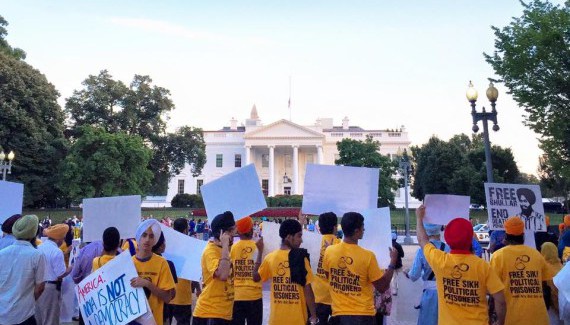U.S. State Department Response on Surat Singh Khalsa Sidesteps Action
Supporters of hunger-striker in India renew outreach to U.S. Congress
Washington, D.C.: Sept. 13, 2015 — A U.S.-based human rights group is reaching out to several congressional offices to ask them to continue requesting U.S. Secretary of State John Kerry recognize 83-year-old Sikh hunger-striker Surat Singh Khalsa’s political protest in Punjab, India.
After six California representatives contacted Kerry’s office in May, the State Department formally responded on June 19, saying that it could not “provide consular services” as “Mr. Khalsa is not a U.S. citizen.” Khalsa’s supporters are frustrated as the congressional letter had not requested consular services but rather asked Kerry to “urge the Indian government to abide by its international human rights commitments under international law and ensure that these rights are safeguarded for political prisoners and all citizens in India.”
Khalsa, who is a U.S. permanent resident, lives in Lathrop, CA but has been hunger-striking in India since January 2015 in demand for release of political prisoners held beyond their release dates.
“Congress has contacted Secretary Kerry twice this year asking him to talk about Bapu Surat Singh Khalsa, but instead of speaking out, he sidestepped an opportunity to stand in support of international human rights,” says Bhajan Singh.
As Founding Director of Organization for Minorities of India (OFMI), Singh has been reaching out to congressional representatives. Last week, he spoke with Northern California Congressman John Garamendi. Now he has words for Khalsa’s supporters: “Bapu’s hunger-strike has inspired thousands of Americans, and if they want to help, they should pick up the phone right now, call their representative in Congress, and ask them to sign a letter to Kerry.”
OFMI, notes Singh, is circulating a sample letter from Congress which states: “We wish to clarify that neither we nor the family are requesting consular services.” Instead, reads the letter: “We are urging the Department of State to speak out in recognition of Mr. Khalsa’s hunger-strike, raise the issue with Indian Prime Minister Narendra Modi, and give a public voice to the concerns about Indian human rights violations which have been brought to us by our constituents and concerned citizens.”
“We hope and pray that Congress will take the right step and sign this letter and that Kerry will pay attention to it,” remarks Singh. “For now, anyone listening to me can help by asking their representative to sign. I encourage everyone to do their part.”
The State Department commonly speaks on international human rights issues. For instance, a September 11 press statement by the Department announced: “We praise these courageous Syrian women who are working to end the violence, and we support their efforts to bring stability and respect for human rights to their community.” The previous day, the Department reported: “We are very concerned about the increasing restrictions on freedom of expression and freedom of association in Ecuador.”


